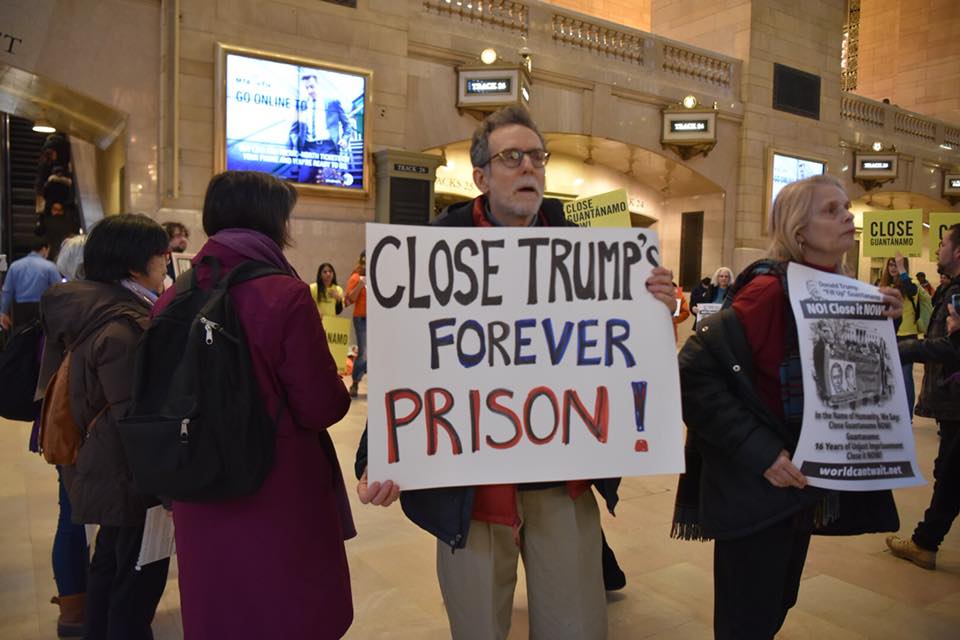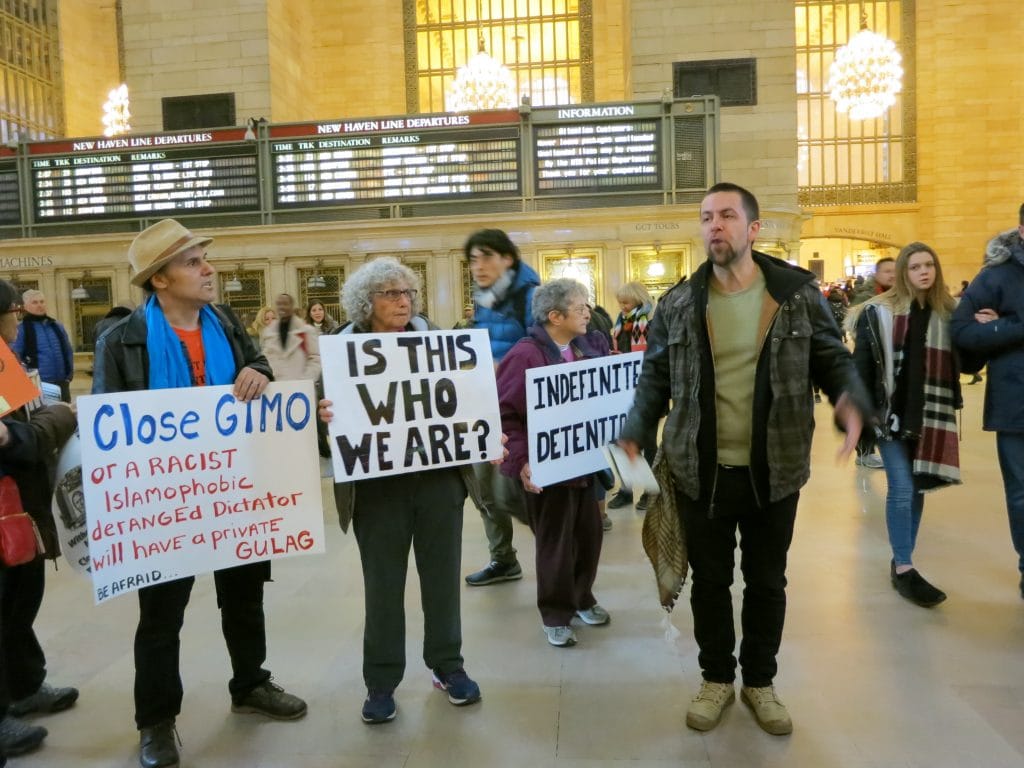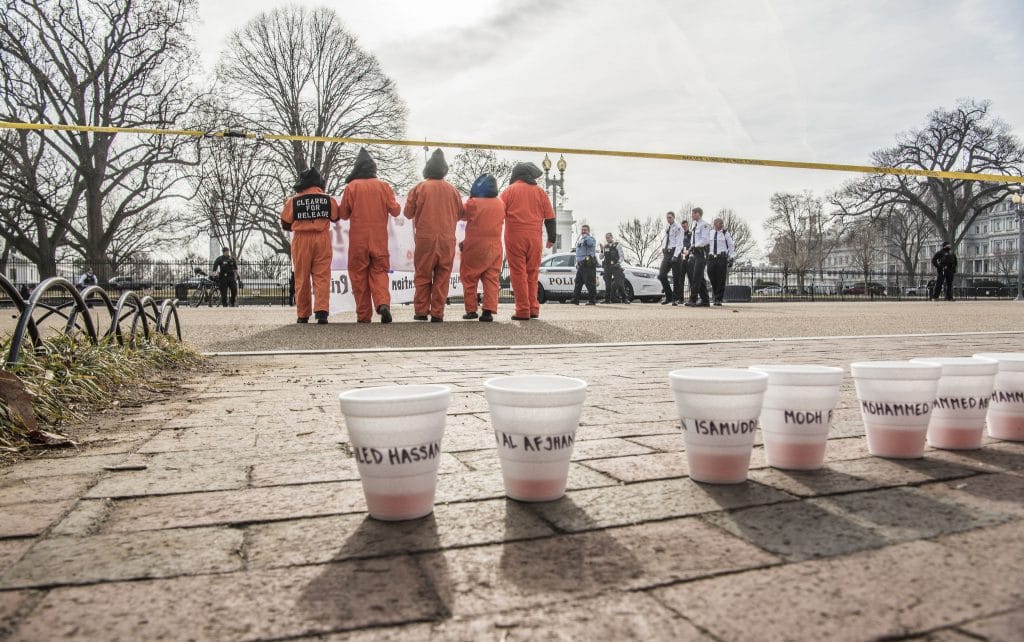January 11-12, 2018
Rally and Action marking 16 years of Guantanamo
“Forty-one hearts still beat in Guantanamo prison cells. That’s forty-one too many,” writes Kathy Kelly in The Progressive on January 11th, the 16th anniversary of the prison.
Marking that sad anniversary, we gathered once again along with 15 coalition organizations for a rally at the White House to call for the closure of Guantanamo and an end to torture and Islamophobia. Read Witness Against Torture’s press release about the rally and arrests that followed. For photos from the rally and WAT action, please see our Flickr page. AJ+ did an excellent, short video about the event.
WAT member Mike Fiala writes about the action and arrests and reflects on the ritual we incorporated. Following his reflection is another written by Lu Aya Nephew.

J11 Action Reflection: A cup of tea
by Mike Fiala
It moves fast here with Witness against Torture, though not our fast from food – that languishes like waves lapping on Lake Erie.
We continue fasting though most of our actions are completed for the week. Continuing the fast is a way to keep remembering the men in Guantanamo. Just because we have accomplished something this week with our witness, they are still there, another day, and another day.
SO, the news here:
5 people from WAT were arrested at the Jan 11th action in front of the White House.
5 Muslim men have been cleared for release and remain in Guantanamo.
Solidarity. FIVE.
Of 41.
Ridah Bin Saleh Al-Yazidi (Tunisia) – Detained for 15 years; Cleared for 10 years
Muieen Adeen Al-Sattar (United Arab Emirates) – Detained for 15 years; cleared for 7 years
Tawfiq Nasir Awad Al-Bihani (Saudi Arabia) – Detained for 14 Years; Cleared for 7 years
Abdul Latif Nasir (Morocco) – Detained for 15 Years; Cleared for 1 year
Sufyian Barhoumi (Algeria) – Detained for 15 Years; Cleared for 1 year
The five from WAT, Ken Jones, Manijeh Saba, Helen Schietinger, Beth Adams, and Brian Terrell, were arrested by the Secret Service after they crossed a police line, and were then handed over to the DC police. It now appears that even walking on to Pennsylvania Avenue which runs in front of the White House and across from Lafayette Park, can get you arrested. Yellow police tape is ready to be rolled out frequently around Pennsylvania Avenue.
At the rally at the White House Jan 11th for the men in Guantanamo, one lawyer shared a letter, message, from her client in Guantanamo. He appreciated our work and effort at support and solidarity. He indicated the importance of it to him, and others there.
The strength of WAT’s nonviolent actions is to use our bodies as the way to connect with the men in Guantanamo. If they are fasting, we must be. If they are imprisoned, we must be too.
And so, when you imagine the beauty of them being released, you imagine what it would be for them to come home to their families.
It is among the ordinary things that families do: to serve tea. It’s the essence of refreshment of friendship. warmth and commensality.
So, after the rally, with speakers addressing the awful injustice done to these men with their continued imprisonment, we had a tea ceremony as though they were returning home.
Each of us from WAT in our orange jumpsuits with black hoods received tea in a cup. We pushed up our black hood at the offer of tea to reveal a person under the hood, and we were served tea, with each man’s name still in Guantanamo called out.
Then we placed our cup, with the man’s name penned on it, on the sidewalk at Lafayette Park, in a row. 41 for the 41 men.
Simple acts, simple hospitality. It is the core of being human.
The men in Guanatanamo, their simple humanity, remembered and called out that they may be released to return to their families, to provide for them, to love them, to eat and drink with them. We sang with passion:
We hear a beautiful sound
It is the breaking of chains.
We see a path full of hope
We have found the way
Let them go home!
Let them go home!
Let them go home!
Let them go today.
And we could see/believe it happening if only for a moment, in hope. It will happen. It’s hard to trust. To trust that the arc of the universe bends towards justice.
So we do something with our bodies to give it a push, to em-body it before it happens. It will be. It will.
So, what kind of tea would you serve the men in Guantanamo when they come home? If/when they come to your home?
And would you fear it, its fierce reality?
What kind of tea did we serve in preparation for their homecoming?
WHOSE AIR?
Reflection by Lu Aya, fka Luke Nephew
January 11 th, 2018
Martin wants to know who owns Pennsylvania Avenue. Fair question. Because
after a procession flowed into a speak out that sang into a ritual of remembrance,
something happened. Five friends slowly turned around and stepped off the
sidewalk and peacefully and strongly walked under the police tape and out into that
very avenue. And then…
Well, let’s go back to the mourning in the morning.
The church basement. The imperfect circle. The solemn song.
Actually, let’s go back to the slaughter of human rights that is occurring during each
second of the day a few miles away in DC Jail and a few hundred miles away in
Guantanamo and in so many more prisons. Let’s return to the breath of the tortured.
The unheard words upon their tongues. The forty-one beating hearts in their chest.
Yes. Let’s return to them.
Wait.
Let’s stay here for a moment.
Right here. Heart. Beat beat. Heart. Breath. Breath. Breath.
Breathe.
Yes.
Let’s stay there.
Even as we go on.
Knowing that the air there is the same air as we breathed here. In and out. Slowly as
we stare across the circle in the church basement. Slowly as we step by step by step
sweeping through the streets of DC with our long line of loved ones. Single file. In
orange jumpsuits and black hoods. Detainees forward. Into a city of fear. Through
the capitol of crushing callous capitalist brick and stone and cold. Let us return to
where we hold a sign saying, “It Would Take A Genius To Close Guantanamo”. Let us
break the park department rules and fill the sidewalk while the park police freak out
over nothing. Lets remain calm. Let’s begin the rally with song. Lets go back to the
faith leaders praying, that comfort may never seduce us away from the struggle for
liberation. And let’s back to the booming voices of comrades catapulting beautiful
cries for justice and freedom in the sky of all those listening. Lets go to the tea
poured
Cup,
By cup
By cup
By 41 cups
That rose up higher and realer and wider than the white house.
And let’s go now
To our family
Who were arrested
For walking
Onto Pennsylvania Ave
And realizing that maybe the streets are actually theirs…
But the air.
The air, my beloved friends,
The air
Is definitely
Ours.
CCR files first major challenge to Trump’s Guantanamo policies
From the Center for Constitutional Rights:
On January 11, CCR and co-counsel filed the first major challenge to Trump’s Guantánamo policies, in federal court in Washington, DC. This collective filing is on behalf of nearly a dozen prisoners who are detained without charge, all for more than a decade. In this court filing, we argue that the petitioners’ perpetual detentions violate the Constitution and the Authorization for Use of Military Force (AUMF), and ask the court to intervene on behalf of the men who have been deemed “forever prisoners.”
Media coverage
The following links give media coverage on the CCR legal challenge and the J11 anniversary:
Statement by Sen. Feinstein
Op-ed by Sharqawi Al Hajjj
Baher Azmy on Slate
Aziz Huq on Guardian
Steve Vladeck on CNN.com
Laura Pitter/HRW on HuffPo
AP
Buzzfeed
The Guardian
Washington Post
McClatchy
AlterNet
HuffPo (news article)
On Friday, WAT members traveled to Baltimore for the opening rally of the Conference on U.S. Foreign Military Bases, organized by the U.S. Coalition Against Foreign Military Bases. Sr. Paulette Schroeder reports back:
Today A group of us had a real desire to travel from D.C. to Baltimore for a rally against the U.S now having close to 800 military bases around the world. The first people to congregate were three well-dressed men from Nepal who will be speakers in the conference to follow on Saturday and Sunday. Folks representing Japan were there. Demonstrators from Code Pink and “No War,” Our Buddhist monk friends, NCNR and many more peace organizations were represented. Witness Against Torture also spoke up urging our country to finally close the base we’ve been fasting to close all week long. A beautiful sense of solidarity pervaded the crowd of about 50 people. Longtime activists in the anti-war movement stood in hope and endurance beside young people entering activism.
This weekend we finish our week-long Fast for Justice with a WAT community retreat ending with a fast-breaking dinner celebration. We offer our readers deep gratitude for accompanying us on this week’s journey.
We close with a poem by Towfiq Bihani, a Guantanamo detainee represented by Reprieve.

Go everywhere you would like my darling.
Don’t look behind.
Don’t fear the sight.
Live in happiness.
In gladness.
Sing as loud as you can,
Dance as much as you would like.
Enjoy all the fun you can.
My darling, forget your past.
And go ahead to start,
A new way, another way
Don’t look back on yesterday
Don’t feel sorry about me,
Or even worry about me
Don’t think who you left behind
Go everywhere you would like
Don’t look behind














